| Srl | Item |
| 1 |
ID:
192628


|
|
|
|
|
| Summary/Abstract |
Under President Xi Jinping, the strengthening of the Chinese Communist Party's political control occurs in conjunction with an evolving administrative role for government-affiliated associations. Analysing associations that are subordinate within China's strict hierarchy but which have degrees of operational freedom yields insights into the changing nature of public service and administration in China. Evidence from 63 interviews conducted from 2018 to 2022 with government departments and affiliated associations in the education sector reveals the complexity of state control and degrees of constrained autonomy achieved by affiliated associations. The government exerts control over financing, personnel appointments and core business activities but, over time, associations gain varying degrees of operational autonomy to influence the education agenda and fill gaps in public services. The interdependency and relational variance we find in the case of Ministry of Education-affiliated associations contributes to broader understandings of the complex and fragmentary nature of the Chinese state and public administration.
|
|
|
|
|
|
|
|
|
|
|
|
|
|
|
|
| 2 |
ID:
138026
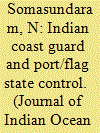

|
|
|
| 3 |
ID:
164961
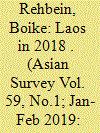

|
|
|
|
|
| Summary/Abstract |
As usual, there is mostly continuity in Laos: solid economic growth, a strong ruling communist party, increasing dependence on China, growing inequality, and tight control of civil society. A new trend, apart from the return of a socialist rhetoric, is an official appraisal of self-sufficiency and anti-globalization.
|
|
|
|
|
|
|
|
|
|
|
|
|
|
|
|
| 4 |
ID:
161122
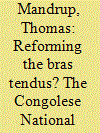

|
|
|
|
|
| Summary/Abstract |
The security sector reform (SSR) programme in the Democratic Republic of the Congo (DRC) has failed, according to a former high-level member of the United Nations (UN) mission in the DRC, as a large section of the country remains outside government control, and the security institutions of the state continue to constitute one of the predominant sources of insecurity for the local population in a number of ways. Based on several field studies, this article critically scrutinises the SSR of the Congolese National Police (Police nationale congolaise; PNC) and the efforts to reform it between 2004 and 2016. It further attempts to explain why so little progress was made in the SSR of the PNC, despite extensive involvement from donors. The article shows that the instrumental and traditional approach to SSR is partly to blame, because in this case it failed to address the root problems and initiate the needed fundamental reform and reconstruction of the police force. It also shows that reforming local security institutions becomes even more difficult when the local authorities do not support the effort.
|
|
|
|
|
|
|
|
|
|
|
|
|
|
|
|
| 5 |
ID:
131514
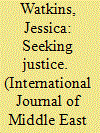

|
|
|
|
|
| Publication |
2014.
|
| Summary/Abstract |
In Jordan, tribal dispute settlements have played a Pivotal Role in the management of various types of grievances between individuals since long before the establishment of the modern state. To varying degrees, Jordanians-from the East and West Banks, Muslim and Christian, urban and rural-cherish the kinship networks associated with these procedures, and the ?a?wa (truce) and ?ul? (reconciliation) processes remain time-honored mechanisms for preventing revenge and making amends for wrongs committed. However, under the state's influence, the purpose of observing tribal settlements is evolving within an increasingly heterogeneous society. Drawing on documentary analysis combined with ethnographic material from across the kingdom, this article investigates the current status of tribal dispute resolution traditions among different sectors of the population. I argue that observance of such traditions can signify conformity with the hegemonic values that the state promotes as well as resistance to aspects of state control.
|
|
|
|
|
|
|
|
|
|
|
|
|
|
|
|
| 6 |
ID:
103986
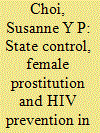

|
|
|
|
|
| Publication |
2011.
|
| Summary/Abstract |
By combining analysis of archival documents and data from 245 sex workers interviewed in south-west China between 2003 and 2007, this article argues that the AIDS crisis has prompted a shift in state discourse about prostitution in China from a victim to a victimizer perspective. Concomitant with this discursive shift is the gradual intensification of control over prostitution. Our data show that the victim perspective overlooks the fact that sex workers are agents who actively negotiate their work and lives amid limited options in post-socialist China. The victimizer perspective, on the other hand, misplaces the blame of unsafe sex practices on sex workers, while in reality it is their clients who refuse to use condoms. The data further suggest that repressive measures against prostitution premised on this victim-victimizer dichotomy inhibit the ability of sex workers to negotiate safe sex practices and aggravate their exposure to HIV risk. The repressive measures undermine the supportive professional networks of sex workers, increase economic pressure on the workers and increase their exposure to client-perpetrated violence.
|
|
|
|
|
|
|
|
|
|
|
|
|
|
|
|